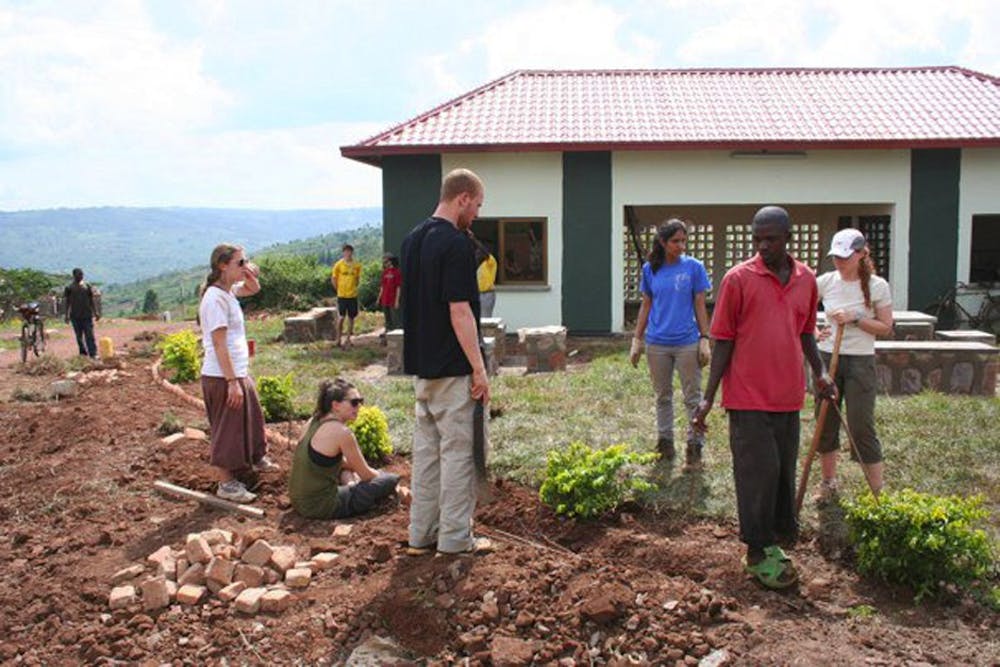
In 1994, an estimated one million people were murdered in the East African country of Rwanda. Today, 17 years later, this mass murder and its effects still sit in the forefront of the minds of the Rwandan people.
Zack Rosen, a rising senior and two-time All-Ivy guard for the Penn basketball team, remembers learning about the Rwandan genocide while he was in high school. It had such a profound effect on him that when the opportunity arose for him to travel to the country in late May on a school-sponsored service trip, he took it.
“I got an email in December about the trip — I didn’t know if it was possible and I had all these reservations,” Rosen recalled. “But I reached out to Dau [Jok], and we just said ‘forget about all the reservations.’”
Jok, a rising sophomore and teammate of Rosen’s on the basketball team, knows about the violence in Africa all too well. When he was just six years old, his father was killed in his home country of Sudan in a civil war.
A dozen other Penn students made the journey to Africa with Rosen and Jok to provide help and resources to people in need. However, before reaching their main destination, the team stopped at the Kigali Genocide Memorial Museum, a place that Jok questioned and admitted was “hard to go [visit].”
“One interesting question that I raised was, ‘Why is the world so consumed with looking into the past? Why are we not looking into the future?’” Jok said. “We spend so much time, so many resources, and so much money looking into the Rwandan genocide, looking into the Holocaust, when we should be proactive about it, because there are genocides happening today.”
After the museum visit, they made their way to the Agahozo-Shalom Youth Village. The Youth Village was designed to provide a home for orphans who lost their families during the genocide and children from all over Rwanda are brought in to live there.
“The most important aspect of the Village is that it gives kids there who are orphans of the genocide — who have no concept of family — it gives them a family, and they’re one big family there,” Rosen stated. “It gives them stability, and it exposes them to something that they wouldn’t have otherwise.”
Jok further explained that the purpose of the Village is “to heal the heart and to give back,” he said.
Once a week, the children serve the community in several different ways, whether it is by tutoring English at elementary schools, building houses for the local community or helping with farming.
In addition to his many experiences, Rosen was most impressed by the attitude of the children in the Village.
“They don’t see differences,” he explained. “They don’t allow themselves to look at differences and say, ‘We should not like each other because we’re different’ … They treat each other like we all wish we treated each other here.”
Rosen also noted the great optimism the children showed when working or studying.
“They get up at 5:30, walk about a half a mile to get a meal, then walk up a steep hill to get to class, and they smile the whole time,” Rosen said. “If you just look at Penn, and myself, we’re all guilty of it — how much time do we spend complaining about having to study? Those kids don’t look at anything like that.”
Rosen couldn’t say enough about how much he learned from the children there and their outlook of the world.
“I would talk about this for days — I want to talk about a game for about a second,” he quipped. “They had more of an effect on me than I had on them.”
Originally, when the group was finished in Rwanda, Jok had planned on going to Sudan while the others headed home. Unfortunately, a violent uprising occurred at about the same time, and he was convinced not to go.
Nevertheless, Jok will soon be starting up the Dut Jok Youth Foundation in Sudan, a program — named after his father — that will combine athletics with academics to provide the children of Sudan with more opportunities for their future.
“Our goal is to harness their God-given potential so they can reach that, and the mission is to empower these kids and close the gap after each generation,” Jok said.
To fund the program, Jok will use the money he was provided when he was named a recipient of the Davis 100 Projects for Peace Award.
“Kids will come to us after school, and most of the time with us will be spent doing an activity, and we’ll also spend time in discussions,” he said.
After-school activities will include basketball, soccer, flag football and track. All the equipment will be provided as well.
“It’s putting the power in the kids’ hands,” Jok explained. “In order for the country to be relevant — economically, socially — they have to empower the youth, so that’s the whole idea that we’re trying to accomplish. Empowering the youth one kid at a time.”
The Daily Pennsylvanian is an independent, student-run newspaper. Please consider making a donation to support the coverage that shapes the University. Your generosity ensures a future of strong journalism at Penn.
DonatePlease note All comments are eligible for publication in The Daily Pennsylvanian.




